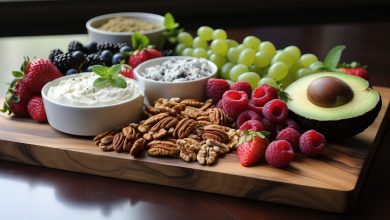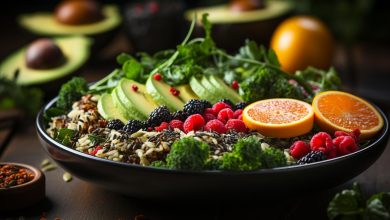Tips for Managing Nutrition During a Marathon

Are you ready to tackle the marathon?
Fueling your body properly is essential for optimal performance.
In this article, we will provide you with valuable tips on managing nutrition during a marathon.
From timing your nutrition to hydrating effectively, we’ve got you covered.
Discover how to choose the right fuel and avoid digestive issues that can hinder your race day experience.
Implementing a well-planned race day nutrition strategy will help you go the distance and achieve your goals.
Let’s get started!
Timing Your Nutrition

You should start fueling your body with carbohydrates and electrolytes at least an hour before the marathon begins. Pre-race nutrition plays a vital role in providing enough energy for your muscles to perform optimally during the race. Consuming carbohydrates, such as whole grain bread, pasta, or fruit, helps replenish glycogen stores in your muscles, giving you sustained energy throughout the event.
Electrolytes are also crucial for proper muscle function and hydration. Sodium and potassium are two important electrolytes that help maintain fluid balance and prevent cramping. Sports drinks or electrolyte-rich foods like bananas can provide these essential minerals.
Post-race recovery is equally important as pre-race nutrition. After completing a marathon, your body needs to replenish glycogen stores and repair damaged muscle tissues. Consuming a combination of carbohydrates and protein within 30 minutes after finishing can aid in this process. Foods like chocolate milk, yogurt with granola, or a turkey sandwich on whole wheat bread can be great options.
Remember to listen to your body during the marathon and adjust your nutrition plan accordingly. Stay hydrated throughout the race by drinking water or sports drinks at regular intervals. By properly timing your nutrition intake before and after the race, you can optimize performance and enhance post-race recovery.
Hydrating Effectively

To hydrate effectively during a marathon, it’s important to drink water consistently throughout your race. Hydration plays a crucial role in maintaining your performance and preventing dehydration. When you sweat during exercise, you not only lose water but also essential electrolytes like sodium, potassium, and magnesium. Maintaining electrolyte balance is vital for proper muscle function and overall hydration.
Preparing a hydration strategy before the race is key. Start by assessing your sweat rate during training runs to determine how much fluid you’ll need to replenish. Aim to drink around 5-10 ounces of fluid every 15-20 minutes while running. It’s best to use an isotonic sports drink that contains electrolytes to replace what you’ve lost through sweating.
During the marathon, make use of water stations along the course and take small sips of water in regular intervals. Don’t wait until you feel thirsty as this may be a sign of dehydration already setting in. Remember that drinking too much water can lead to hyponatremia – a condition where sodium levels are diluted in the blood.
Choosing the Right Fuel

When choosing the right fuel for a marathon, it’s important to consider your individual needs and preferences. The food you consume before and after a race can greatly impact your performance and recovery. Pre-race fuel should provide you with sustained energy without causing any digestive issues. It should consist of easily digestible carbohydrates that will help replenish glycogen stores in your muscles. Some popular options include bananas, oatmeal, or energy bars.
Post-race recovery is just as crucial as pre-race fueling. Consuming the right nutrients after a marathon can aid in muscle repair and glycogen replenishment. Protein-rich foods are essential for repairing damaged muscle tissues, while carbohydrates help restore depleted glycogen levels.
To better understand which foods are best for pre and post-race nutrition, let’s take a look at this table:
| Pre-Race Fuel | Post-Race Recovery |
|---|---|
| Bananas | Greek Yogurt |
| Oatmeal | Chicken Breast |
| Energy Bars | Quinoa |
| Peanut Butter | Sweet Potatoes |
Remember to listen to your body and experiment with different foods during training runs to find what works best for you. It’s also important to stay hydrated throughout the race by drinking water or sports drinks regularly. By paying attention to your nutritional needs, you’ll be able to optimize your performance and enhance post-race recovery.
Avoiding Digestive Issues

If you experience digestive issues during a marathon, it may be helpful to avoid high-fiber foods and spicy or greasy dishes. These types of foods can irritate your stomach and lead to discomfort or cramps while running. Instead, focus on consuming easily digestible carbohydrates like bananas, oatmeal, or energy gels. These provide the necessary energy without causing gastrointestinal distress.
To prevent cramps and promote optimal digestion during a race, here are three tips:
1. Hydrate properly: Staying hydrated is crucial for preventing muscle cramps and maintaining digestive health. Drink plenty of water leading up to the race and continue hydrating during the event. Consider electrolyte-rich drinks to replenish essential minerals lost through sweat.
2. Practice pre-race nutrition: Experiment with different meals before your training runs to find what works best for you. Consuming a balanced meal 2-4 hours before the race can help settle any nerves while providing you with adequate fuel.
3. Manage pre-race nerves: Anxiety and stress can impact digestion, so finding ways to manage pre-race nerves is important. Engage in relaxation techniques such as deep breathing exercises or visualization to calm your mind and body.
Implementing a Race Day Plan

On race day, remember to hydrate properly and practice pre-race nutrition in order to optimize your performance and minimize any potential digestive issues. Your pre-race meal is crucial for providing you with the energy you need for the marathon. Aim for a balance of carbohydrates, proteins, and fats about 2-4 hours before the race. Some good options include oatmeal with fruit and nuts, whole grain toast with peanut butter, or a smoothie with Greek yogurt and berries.
During the race, it’s important to stay hydrated. Drink water or sports drinks at regular intervals to replace the fluids lost through sweat. Don’t wait until you feel thirsty as that can be a sign of dehydration. It’s also helpful to consume small amounts of easily digestible carbohydrates during longer races to maintain your energy levels.
Once you’ve crossed the finish line, focus on post-race recovery. Refuel your body within 30 minutes by consuming a mix of carbohydrates and protein. This could be a banana with almond butter or a protein shake. Replenishing your glycogen stores will help kickstart muscle repair.
Remember that every runner is different, so it’s important to experiment during training runs to find what works best for you. By implementing a race day plan that includes proper hydration, pre-race nutrition, and post-race recovery strategies, you’ll be setting yourself up for success on marathon day!
Conclusion
In conclusion, managing your nutrition during a marathon is crucial for optimal performance. By timing your nutrition intake, hydrating effectively, and choosing the right fuel, you can ensure that you have the energy and stamina to complete the race successfully.
Avoiding digestive issues is also important, as they can hinder your performance. Implementing a well-thought-out race day plan will further enhance your performance. Remember, as the saying goes, “You are what you eat.” So make sure to fuel yourself with nutritious foods and stay hydrated to conquer those miles with ease.






